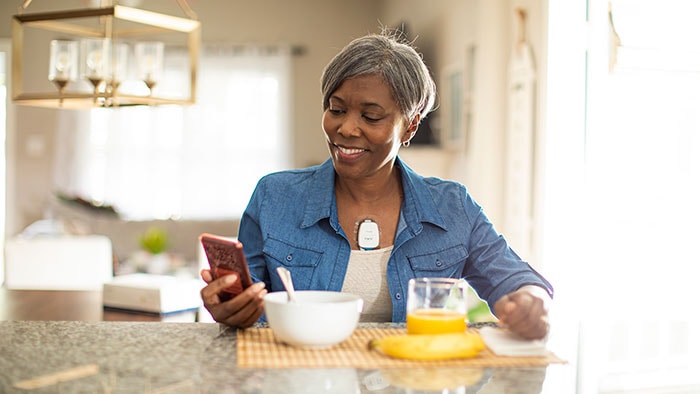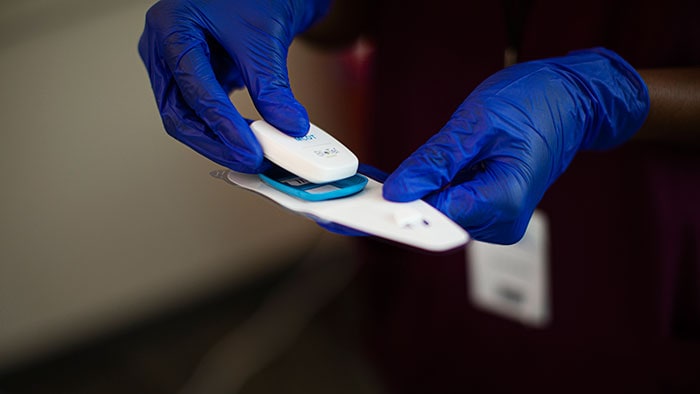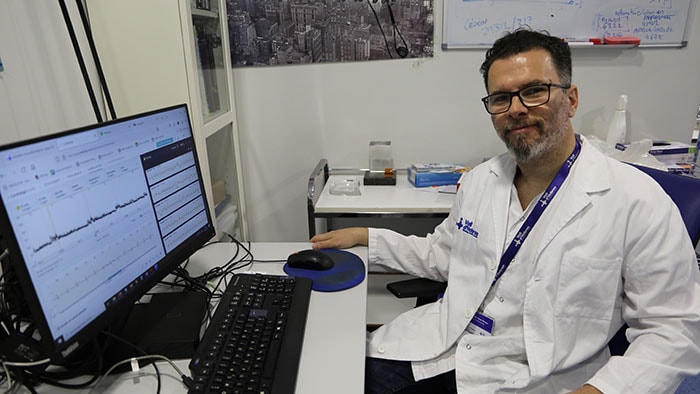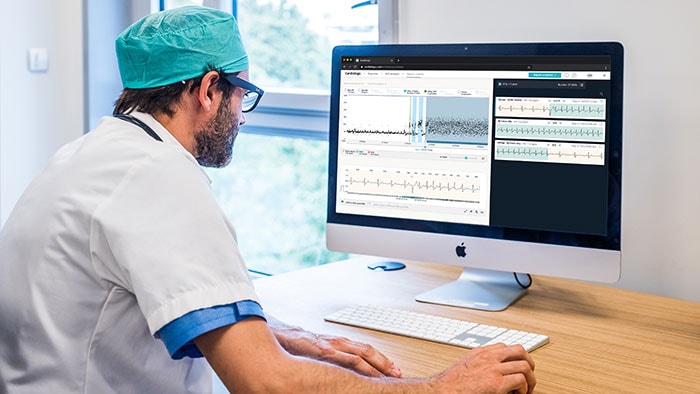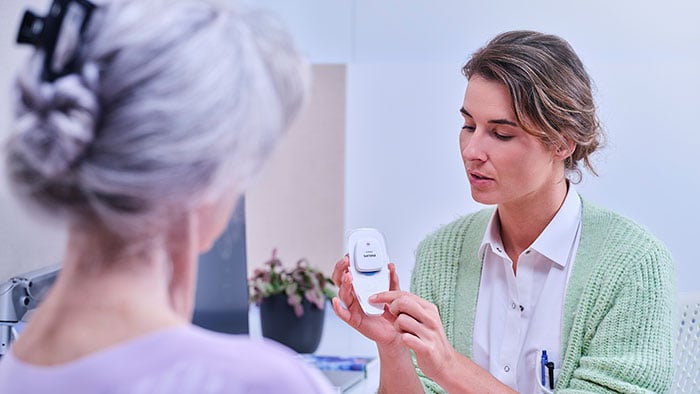Philips ePatch and AI analytics platform rolled out to 14 hospitals across Spain to monitor heart patients
May 22, 2024 | 3 minute read
Amsterdam, the Netherlands, and Madrid, Spain – Royal Philips (NYSE: PHG, AEX: PHIA), a global leader in health technology, today announced the successful nationwide rollout of its ambulatory cardiac monitoring service in Spain using its unique wearable ePatch paired with its AI-driven Cardiologs analytics platform. 14 Spanish healthcare providers across the country are now using the company’s ePatch extended wear Holter monitors to detect life-threatening heart arrhythmias such as atrial fibrillation (AF). The solution has been proven to detect heart arrhythmias missed by traditional Holter monitors, enhance patient comfort, improve care access, and potentially better clinical outcomes, in addition to reducing overall costs.
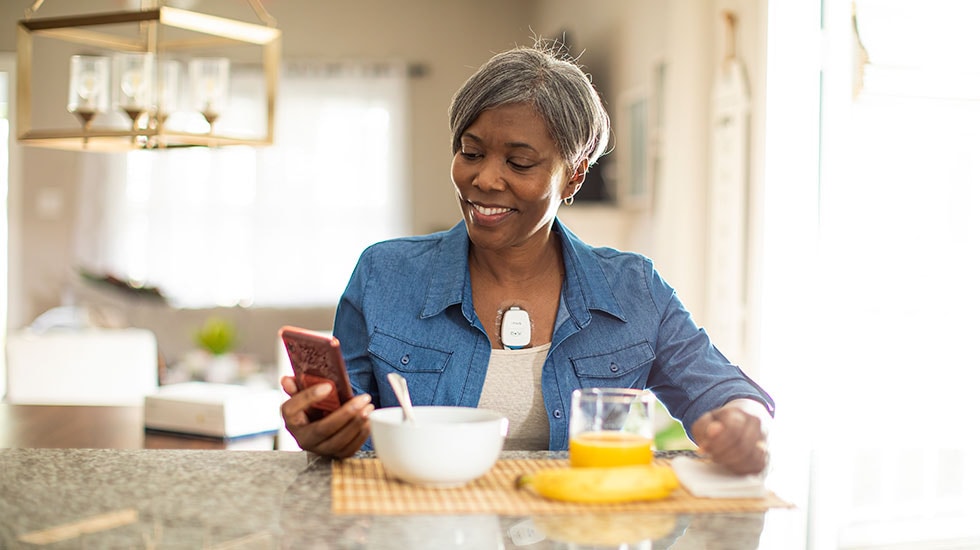
Philips’ ePatch provides reliable data for up to 14 days of continuous monitoring. When paired with Philips’ AI-driven Cardiologs analytics platform, the solution empowers the hospitals’ cardiology and neurology teams with an end-to-end solution that enhances their ability to detect and diagnose AF – a potentially life-threatening [1] cardiac arrhythmia and also the world’s most common. AF significantly increases the risk of stroke, dementia, and heart failure, yet often goes undetected due to its lack of noticeable symptoms and infrequent occurrence intervals.
The key advantage for healthcare professionals lies in its user-friendly interface and high-quality 14-day continuous recording capabilities.
"The key advantage for healthcare professionals lies in its user-friendly interface and high-quality 14-day continuous recording capabilities," said Dr. Jorge Pagola, Neurologist Postdoctoral Researcher at University Hospital Vall d'Hebron, Barcelona, Spain. "Applied as a chest patch in just a few minutes, it seamlessly integrates an analysis program, facilitating swift examination of recordings. Thanks to its AI-based analysis assistant, AF events can be classified for rapid review by our team. Patients experience enhanced comfort as they are free from cumbersome cables of the conventional Holter, allowing them to dress, shower, and carry out their daily activities without any hindrance."
Dr. Jorge Pagola further explains, “Using the ePatch program, we expedited hospital discharge for 80 patients in 2023. This initiative led to a reduced average length of stay, relieved emergency room pressure, and an estimated total cost reduction of € 28.800 in 2023 [2].”
Pilot programs in major hospitals across Spain
In addition to Hospital Vall d'Hebron, where Philips’ ePatch is being used to detect post-discharge AF in patients, pilot projects demonstrating the device’s effectiveness in cardiology and neurology are being conducted at other major hospitals in Madrid, Barcelona, Bilbao, Alicante, Madrid, Cadiz, and Navarra [3]. Applications include monitoring patients for AF after cardiac ablation therapy or heart valve replacement procedures, and studies of the link between magnesium insufficiency and AF.
In some Spanish hospitals, the ease-of-use and cost benefits of Philips ePatch are helping reduce waiting lists that built up during the COVID-19 pandemic, making a tangible difference to people’s access to care. In total, more than 1500 patients are currently being monitored with Philips ePatch devices in Spain.
“This innovative new service allows clinical teams to conveniently monitor patients as they go about their everyday activities for extended periods of time, collecting the real-life data that helps reveal the patient’s true condition,” said Miquel Barras, Ambulatory Monitoring & Diagnostics Lead for Philips in Spain.
In a recent US study comparing the diagnostic abilities of 7-day and 14-day monitoring with Philips’ extended wear ePatch compared to conventional 24-hour Holter monitoring, the ePatch detected 2x more clinically significant heart arrhythmias during 7 days of monitoring and more than 2.5x as many over 14 days [4].
Sources [1] Heart.org
[2] Data on file in hospital Vall d'Hebron
[3] Madrid: Hospital Universitario Fundación Jiménez Díaz, Hospital Universitario Infanta Elena, Hospital de La Princesa, University Hospital Quironsalud Madrid, Hospital Universitario Rey Juan Carlos. Barcelona: Vall d'Hebron University Hospital, Hospital Clínic de Barcelona, Hospital de Sant Joan Despí Moisès Broggi, Hospital Sant Joan de Déu Barcelona, Hospital Universitari de Bellvitge, Hospital de Sant Pau. Bilbao: Hospital Universitario Cruces. Alicante: Hospital General Universitario de Elche. Cadiz: Hospital Universitario De Jerez. Navarra: Hospital General de Navarra.
[4] Parikh, P, Grigoriadis, C, Dunn, A. et al. Diagnostic Yield of 24-hour Holter vs 7-day and 14-day ePatch Extended Wear Holter. J Am Coll Cardiol. 2023 Mar, 81 (8_Supplement) 149. Research conducted by Philips ECG Solutions.
https://doi.org/10.1016/S0735-1097(23)00593-4
